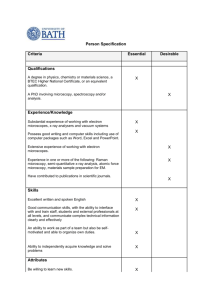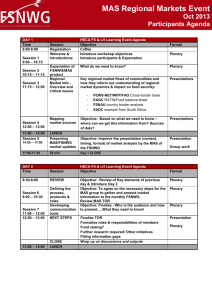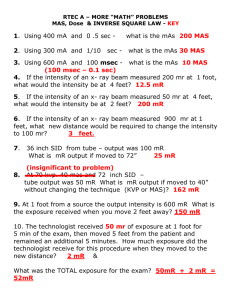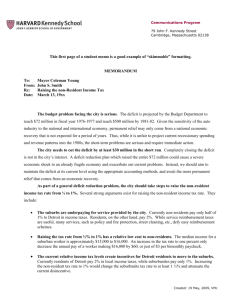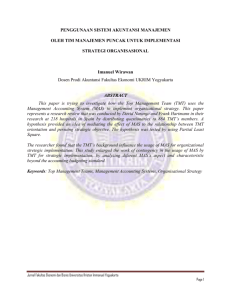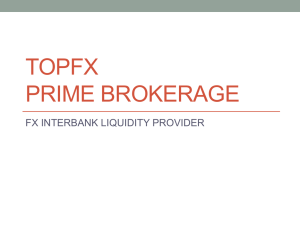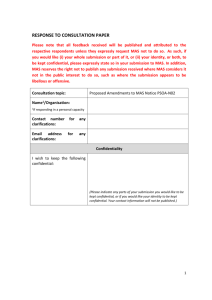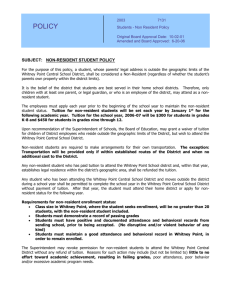FREQUENTLY ASKED QUESTIONS ON MAS NOTICE 757 AND
advertisement
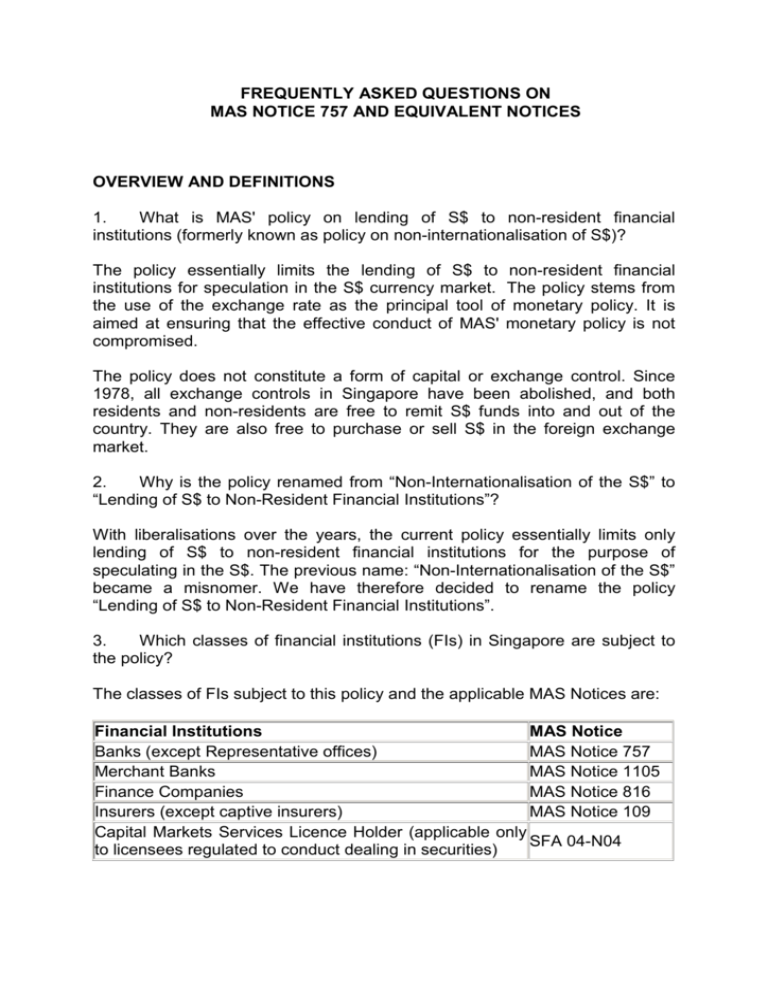
FREQUENTLY ASKED QUESTIONS ON MAS NOTICE 757 AND EQUIVALENT NOTICES OVERVIEW AND DEFINITIONS 1. What is MAS' policy on lending of S$ to non-resident financial institutions (formerly known as policy on non-internationalisation of S$)? The policy essentially limits the lending of S$ to non-resident financial institutions for speculation in the S$ currency market. The policy stems from the use of the exchange rate as the principal tool of monetary policy. It is aimed at ensuring that the effective conduct of MAS' monetary policy is not compromised. The policy does not constitute a form of capital or exchange control. Since 1978, all exchange controls in Singapore have been abolished, and both residents and non-residents are free to remit S$ funds into and out of the country. They are also free to purchase or sell S$ in the foreign exchange market. 2. Why is the policy renamed from “Non-Internationalisation of the S$” to “Lending of S$ to Non-Resident Financial Institutions”? With liberalisations over the years, the current policy essentially limits only lending of S$ to non-resident financial institutions for the purpose of speculating in the S$. The previous name: “Non-Internationalisation of the S$” became a misnomer. We have therefore decided to rename the policy “Lending of S$ to Non-Resident Financial Institutions”. 3. Which classes of financial institutions (FIs) in Singapore are subject to the policy? The classes of FIs subject to this policy and the applicable MAS Notices are: Financial Institutions MAS Notice Banks (except Representative offices) MAS Notice 757 Merchant Banks MAS Notice 1105 Finance Companies MAS Notice 816 Insurers (except captive insurers) MAS Notice 109 Capital Markets Services Licence Holder (applicable only SFA 04-N04 to licensees regulated to conduct dealing in securities) 4. Does the definition of a resident stipulated in MAS Notice 757 and equivalent Notices apply to other MAS Notices and regulations? No, the definition of a Singapore resident stipulated in MAS Notice 757 and equivalent Notices is relevant only for the purposes of the policy on lending of S$ to non-resident financial institutions. CREDIT FACILITIES 5. Why has MAS fully liberalised cross-currency swaps, yet retained restrictions on FX swaps? MAS has liberalised cross currency swaps to facilitate capital market development in Singapore. There is no restriction where the need for cross currency swaps arises from capital market, economic and financial activities. However, note that the S$5m FX swaps restriction still applies. Cross currency swaps should not be used by financial institutions in Singapore to circumvent the S$5m FX swaps restriction. 6. The Notice 757 and equivalent Notices do not make any reference to asset swaps, cross-currency swaps and repos, or FX options. Have restrictions on such activities been lifted? Restrictions on FX options, asset swaps, cross-currency swaps and repos have been lifted since 20 March 2002. No other restrictions or guidelines will apply to the use of S$, other than those explicitly stated in the new Notices and as clarified in the FAQs. 7. Does the purchase by a bank of S$ bonds issued by non-resident financial institutions constitute an extension of a S$ credit facility? No. For the purposes of the policy on lending of S$ to non-resident financial institutions, the purchase of S$ bonds issued by non-resident financial institutions does not constitute an extension of a S$ credit facility. 8. Re paragraph 2.1.2, how should FIs treat non-resident entities that may carry out activities similar to those specified in paragraph 2.1.2, but that may not be licensed as such? Non-resident entities whose main business activities are substantially similar to those described under paragraph 2.1.2 should be considered as financial institutions. 9. Overdrafts of S$ vostro accounts may arise due to non-receipt of funds. How should this be treated? Banks may extend temporary S$ overdrafts of any amount to vostro accounts of non-resident financial institutions for the purpose of preventing settlement failures. With effect from 28 May 2004, banks are no longer required to obtain documentary proof of pre-advised funds before extending the overdrafts to prevent settlement failures. This would facilitate more efficient handling of S$ payments. Banks must take reasonable efforts to ensure that the overdrafts are covered within two business days. 10. How should FIs observe the provision that they shall not extend S$ credit facilities exceeding S$5 million "if there is reason to believe that the S$ proceeds may be used for S$ currency speculation"? FIs are expected to institute appropriate internal controls and processes to comply with this restriction. For S$ credit facilities other than overdrafts on vostro accounts, these may include (but not limited to): • Written confirmation from the non-resident financial institution specifying the purpose of funding. • Formal evaluation process of the client profile, which provides a clear basis for assessing that the client is unlikely to use the S$ proceeds for currency speculation. For S$ overdrafts on vostro accounts for the purpose of preventing settlement failures, FIs should take steps to ascertain whether the S$ overdrafts are used to fund S$ currency speculation if the occurrence of such overdrafts are unusually frequent and/or regular. 11. Is the limit of S$5 million per entity on S$ credit facilities to nonresidents a gross or a net limit? The S$5 million limit is a gross limit. FIs should not offset their S$ credit facility extended to one branch against the receipt of S$ from another branch. For example, if Bank A based in Singapore transacted a S$5 million sell/buy S$ FX swap with its London branch and a S$5 million buy/sell S$ FX swap with its New York branch, Bank A would have extended S$5 million in credit facilities to its overseas branches. The FX swaps between the two overseas branches cannot be netted off. 12. Can FIs centrally book their S$ trades offshore? Any FI that wish to centrally book their trades in the name of an offshore entity should write to the relevant supervisory department in MAS for approval. Approval will be given on a case-by-case basis and subject to certain prescribed conditions. FIs should not use central booking arrangements to circumvent MAS' policy on lending of S$ to non-resident financial institutions. 13. S$ Liquidity Providers, under the CLS liquidity provider agreement, may be called upon to provide S$ to CLS Bank via today/tomorrow FX swap. Is this permitted under MAS Notice 757? MAS understands that a Settlement Member's failure to satisfy its pay-in obligations to CLS Bank creates an uncovered short position that must be funded by CLS Bank. This risk is mitigated by having committed liquidity providers provide funds in the needed currency to CLS Bank. By becoming committed liquidity providers, banks play a role in reducing FX settlement risks under the CLS environment. The S$ lending restrictions in MAS Notice 757 will not apply to S$ Liquidity Providers when they provide S$ to CLS Bank under their obligations as a liquidity provider. 14. As a liquidity management measure, a Settlement Member of CLS Bank may transact intraday In/Out Swaps with another Settlement Bank. Such transactions may result in Singapore banks providing S$ to non-resident financial institutions via intraday FX swap. Is this permitted under MAS Notice 757? MAS understands that In/Out Swaps are used within the CLS environment to manage liquidity risks arising from possible large-value, time-sensitive pay-ins. They are essentially intraday transactions with no change in overnight funding position. The S$ lending restrictions in MAS Notice 757 will not apply to intraday In/Out Swaps used for the purpose of managing liquidity risk arising from pay-in obligations to CLS Bank. 15. Relating to Q14, what if a Singapore bank enters into an intraday In/Out swap with a non-resident financial institution, and the entity fails to settle the 2nd leg of the In/Out swap within the same day, which causes the Singapore bank to extend inadvertently a temporary overdraft of more than S$5M to the entity? The S$ lending restrictions in MAS Notice 757 will not apply to overdrafts arising from such non-receipt of pre-advised funds. However, banks must take reasonable efforts to ensure that the overdrafts are covered within 2 business days. BOND ISSUANCE 16. When FIs arrange S$ equity/bond issues for non-resident entities that are not financial institutions, must the S$ proceeds be swapped or converted into foreign currency before remitting abroad? With effect from 28 May 2004, non-resident non-financial issuers of S$ bonds and equities will no longer be required to swap or convert their S$ proceeds into foreign currencies before remitting abroad. This would allow the issuers greater flexibility in managing their S$ funds. 17. When FIs arrange S$ equity/bond issues for non-residents financial institutions, must the entire S$ proceeds be swapped out immediately? The requirement to swap out S$ proceeds from bond issues applies when the proceeds are to be used outside Singapore. Where the proceeds are to be used for future investments in Singapore, or where there is no immediate need for the proceeds for overseas purposes, the non-resident issuer may maintain the S$ proceeds with a bank in Singapore. S$ DERIVATIVES 18. A non-resident financial institution has S$ options positions. Can a Singapore financial institution transact S$ forwards with the non-resident to enable the non-resident to hedge their S$ options positions? For the purpose of this Notice, MAS makes a distinction between outright forwards and FX swaps. In the above scenario on hedging of S$ options positions, the use of S$ outright forwards is permitted. However, the S$5m restriction on FX swaps still applies. REPORTING REQUIREMENTS 19. Must S$ credit facilities extended to exempted non-resident individuals and non-financial entities be reported? No, as these entities are exempted from the restrictions of the notice, they are not to be included for reporting under Appendix I. 20. For S$ credit facilities extended to resident financial institutions with central booking arrangements, would banks need to include such credit facilities for reporting under Appendix 1? No. There is no need to include S$ credit facilities extended to resident financial entities with central booking arrangements under Appendix 1. 21. What are some examples of “Non-Resident Financial Institutions in Singapore” in Appendix 1? Non-resident financial institutions in Singapore are those more than 50%owned by foreigners and not subject to Notice 757 or equivalent Notices. One example is foreign-owned fund management companies operating in Singapore.
